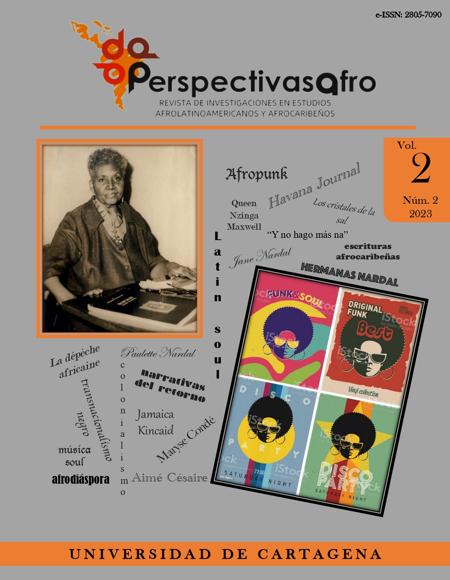Diálogos afro-hemisféricos. Soul music y transnacionalismo negro en contextos afrolatinoamericanos
Afro-hemispheric dialogues. Soul music and black transnationalism in Afro-Latin American contexts
Contenido principal del artículo
Resumen
Palabras clave
Descargas
Datos de publicación
Perfil evaluadores/as N/D
Declaraciones de autoría
Indexado en
- Sociedad académica
- Universidad de Cartagena
- Editorial
- Universidad de Cartagena
Detalles del artículo
Referencias (VER)
Alberto, Paulina. “When Rio Was Black: Soul Music, National Culture, and the Politics of Racial Comparison in 1970s Brazil.” Hispanic American Historical Review 89/1 (2009): 3-39. DOI: https://doi.org/10.1215/00182168-2008-043
Andrews, George Reid. Afro-Latin America, 1800-2000. Oxford: Oxford UP, 2004. DOI: https://doi.org/10.1093/oso/9780195152326.001.0001
Baraka, Amiri. Blues People: Negro Music in White America, New York: Harper Perennial, 1999 [1963].
Bataan, Joe. Entrevista personal, 13 de Setiembre, 2018.
Bourdieu, Pierre /Loïc Wacquant: “On the Cunning of Imperialist Reason”. Theory, Culture, Society 16/ 1 (1999): 31-58. DOI: https://doi.org/10.1177/026327699016001003
Brown, Carlos. Entrevista personal. 2 de Abril, 2017.
Carvalho, José Jorge de. Las culturas afroamericanas en Iberoamérica: Lo negociable y lo innegociable. Bogotá: Universidad Nacional de Colombia, 2005.
Conniff, Michael. Black Labor on a White Canal - Panamá, 1904-1981. Pittsburgh: University of Pittsburgh Press, 1985.
Corinealdi, Kaysha. “Envisioning Multiple Citizenships: West Indian Panamanians and Creating Community in the Canal Zone Neocolony”, in: The Global South, Vol. 6, No. 2 (Fall 2012): 87-106. DOI: https://doi.org/10.2979/globalsouth.6.2.87
Davis, Angela. Women, Culture, and Politics. New York: Random House, 1989.
Dulitzky, Ariel. “A Region in Denial: Racial Discrimination and Racism in Latin America”. Neither Enemies nor Friends: Latinos, Blacks, Afro-Latinos. Anani Dzidienyo and Suzanne Oboler (eds.). London: Palgrave, 2005. 39-59. DOI: https://doi.org/10.1057/9781403982636_2
Flores, Juan. From Bomba to Hip Hop: Puerto Rican Culture and Latino Identity. New York: Columbia UP, 2000.
Ford, Tanisha. Liberated Threads: Black Women, Style, and the Global Politics of Soul. Chapel Hill: The University of North Carolina Press, 2015. DOI: https://doi.org/10.5149/northcarolina/9781469625157.001.0001
Frias, Lena. “Black Rio: o orgulho (importado) de ser negro no brasil”. Jornal do Brasil, Caderno B, 17 de julio, 1976, 1, 4-6.
Gilroy, Paul. There Ain’t No Black in the Union Jack. London: Routledge, 1987.
_____ The Black Atlantic – Modernity and Double Consciousness. London: Verso, 1993.
Gomez Menjivar, Jennifer y Hector Nicolas Ramos Flores, eds. Hemispheric Blackness and the Exigencies of Accountability. Pittsburgh: University of Pittsburgh, 2022. DOI: https://doi.org/10.2307/j.ctv35bfdxw
Hanchard, Michael. Orpheus and Power – The Movimento Negro of Rio de Janeiro and São Paulo, Brazil, 1945-1988. Princeton: Princeton University Press, 1994.
_____ “Black Transnationalism, Africana Studies, and the 21st Century.” Journal of Black Studies 35/2 (2004): 139-153. DOI: https://doi.org/10.1177/0021934704266718
Jiménez Román, Miriam and Juan Flores (eds.). The Afro-Latin@ Reader: History and Culture in the United States. Durham: Duke UP, 2010. DOI: https://doi.org/10.1215/9780822391319
Kelley, Robin D.G. Freedom Dreams: The Black Radical Imagination. Boston: Beacon Press, 2002.
Laó-Montes, Agustín and Arlene Davila (eds). Mambo Montage – The Latinization of New York. New York: Columbia UP, 2001. DOI: https://doi.org/10.7312/lao-11274
_____ “Cartografía del campo político afrodescendiente en América Latina“, En Debates sobre ciudadanía y políticas raciales en las Américas Negras.ed. Claudia Mosquera Rosero-Labbé, Agustín Laó-Montes, César Rodríguez Garavito (eds.). Bogotá: Universidad Nacional de Colombia, 2010. 279-316.
_____ Contrapunteos Diaspóricos: Cartografías Políticas de Nuestra Afroamérica. Bogotá: Universidad Externado de Colombia, 2020.
_____ “’Unfinished Migrations’: Commentary and Response”. African Studies Review 43/1 (2000): 54-60. DOI: https://doi.org/10.2307/524720
Lowe de Goodin, Melva. “Entrevista personal”, Abril 3, 2022.
Lewis, Earl. “To Turn As on A Pivot: Writing African American History into a History of Overlapping Diasporas”. The American Historical Review 100/3 (1995): 765-787. DOI: https://doi.org/10.2307/2168604
Lipsitz, George. Dangerous Crossroads – Popular Music, Postmodernism and the Politics of Place. Verso, 199.
Lordi, Emily, The Meaning of Soul: Black Music and Resilience since the 1960s. Durham: Duke University Press, 2020. DOI: https://doi.org/10.1215/9781478012245
Luciano, Felipe. Entrevista personal, 30 de Setiembre, 2022.
Masiki, Trent & Regina Marie Mills. “Introduction: Bridging African American and Latina/o/x Studies.” The Black Scholar 52:1 (2022). 1-4. DOI: https://doi.org/10.1080/00064246.2022.2007341
Medeiros, Carlos Alberto. “Black Rio: Music, Politics, and Black Identity,” en: Black Power in Hemispheric Perspective – Movements, Cultures, and Resistance in the Black Americas. Wilfried Raussert & Matti Steinitz (eds.). New Orleans University Press, 2022. 239-250.
Nwankwo, Ifeoma Kiddoe. “The Promises and Perils of US African-American Hemispherism: Latin America in Martin Delany´s Blake and Gayl Jones´s Mosquito.” Hemispheric American Studies: Essays Beyond the Nation. Caroline Levander and Robert Levine, (eds.). Nueva Jersey: Rutgers University Press, 2008. 187-204. DOI: https://doi.org/10.36019/9780813543871-011
Olivera, Asfilofio. Entrevista personal. April 1, 2019.
Raussert, Wilfried & Matti Steinitz (eds.). Black Power in Hemispheric Perspective – Movements, Cultures, and Resistance in the Black Americas. New Orleans University Press: 2022.
Pérez-Price, Ariel. Pionero: La historia de Luis Russell. Panamá: 2021.
Púlido Ritter, Luis. “Lord Cobra: del cosmopolitismo decimonónico y del folklorismo al cosmopolitismo diaspórico”. Istmo 20 (2010): 3.
Rivera-Rideau, Petra R., Jennifer A. Jones, and Tianna S. Paschel, eds. Afro-Latin@s in Movement: Critical Approaches to Blackness and Transnationalism in the Americas. New York: Palgrave McMillan, 2016. DOI: https://doi.org/10.1057/978-1-137-59874-5
Rivera, Raquel Z. “Hip-Hop, Puerto Ricans, and Ethnoracial Identities in New York.” Mambo Montage – The Latinization of New York, edited by Agustín Laó-Montes and Arlene Dávila. Columbia UP, 2001. 235-262. DOI: https://doi.org/10.7312/lao-11274-010
Rivero, Yeidy. Tuning Out Blackness: Race and Nation in the History of Puerto Rican Television. Duke UP Books, 2005. DOI: https://doi.org/10.2307/j.ctv113148q
Slate, Nico, ed. Black Power Beyond Borders. New York: Palgrave Macmillan, 2012. DOI: https://doi.org/10.1057/9781137295064
Smethurst, James. The Black Arts Movement: Literary Nationalism in the 1960s and 1970s. Chapel Hill: University of North Carolina Press, 2005.
Stam, Robert and Ella Shohat. Race in Translation – Culture Wars Around the Postcolonial Atlantic. New York: New York UP, 2012.
Steinitz, Matti. “Black Power in a paraíso racial? The Black Rio movement, U.S. Soul music, and Afro-Brazilian mobilizations under military rule (1970-1976)”. En: Politics of Entanglement: Connecting Transnational Flows and Local Perspectives. Publisher: Wissenschaftlicher Verlag Trier/Bilingual Press, 2017. 13-30.
––––– " ‘Calling Out Around the World’: How Soul Music Transnationalized the African American Freedom Struggle in the Black Power Era (1965-1975)”. En Sonic Politics: Music and Social Movements in the Americas. Olaf Kaltmeier & Wilfried Raussert (eds.). Routledge, 2019. 88-106. DOI: https://doi.org/10.4324/9780429423932-6
––––– “We got Latin Soul! Transbarrio Dialogues and Afro-Latin Identity Formation in New York’s Puerto Rican Community during the Age of Black Power (1966–1972).” Human Rights in the Americas. Ed. Luz Kirschner, Maria Herrera Sobek, and Francisco Lomeli. New York/London: Routledge, 2021. 243–262. DOI: https://doi.org/10.4324/9781003120315-19
––––– “Soulful Sancocho - Soul Music and Practices of Hemispheric Black Transnationalism in 1960s and 1970s Panama.” The Black Scholar 52/1 (2022): 15-26. DOI: https://doi.org/10.1080/00064246.2022.2007344
Swan, Quito. “Transnationalism”. Keywords for African American Studies. Erica R. Edwards, Roderick A. Ferguson, and Jeffrey O. G. Ogbar (eds.). New York: New York UP, 2018. 209-213.
Torres, Andrés. Between Melting Pot and Mosaic – African Americans and Puerto Ricans in the New York Political Economy. Temple University Press, 1995.
Valero, Silvia. “Los negros se toman la palabra.” Primer Congreso de Cultura Negra de las Americas: debates al interior de las comisiones y plenarias. Bogotá, Cartagena: Universidad Javeriana, Universidad de Cartagena, CEA, 2020.
Vincent, Rickey. Party Music: The Inside Story of the Black Panthers’ Band and How Black Power Transformed Soul Music. Chicago: Chicago Review Press, 2013.
Wimmer, Andreas and Nina Glick Schiller. “Methodological nationalism and beyond: nation-state building, migration and the social sciences.” Global Networks 2/4 (2002): 301–33. DOI: https://doi.org/10.1111/1471-0374.00043
Zapata Olivella, Manuel. ¡Levántate mulato! ‘Por mi raza hablará el espíritu’. Bogotá: Rei Andes, 1990.



 PDF
PDF
 FLIP
FLIP






